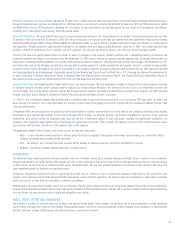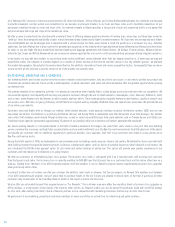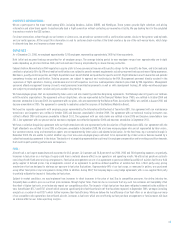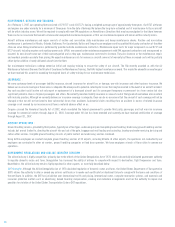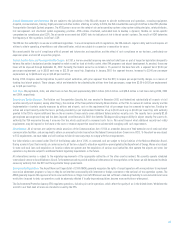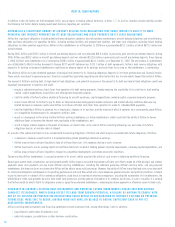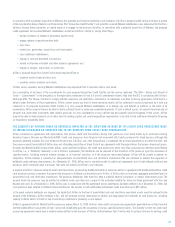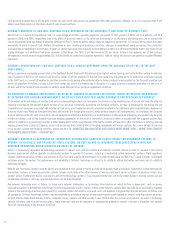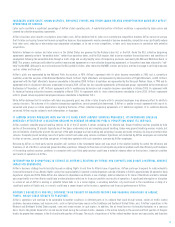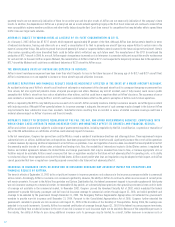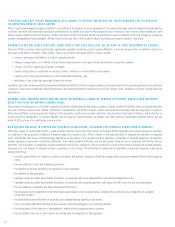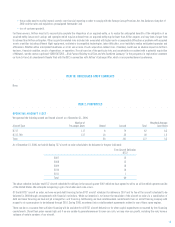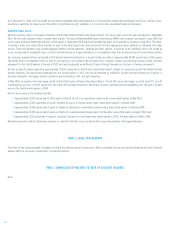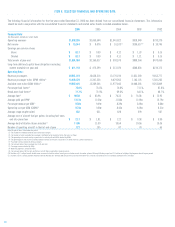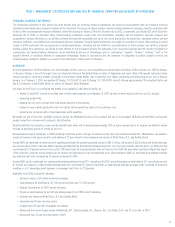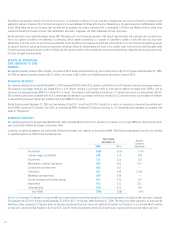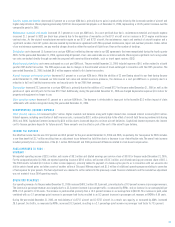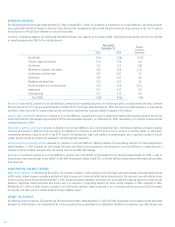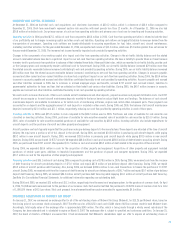Airtran 2006 Annual Report Download - page 19
Download and view the complete annual report
Please find page 19 of the 2006 Airtran annual report below. You can navigate through the pages in the report by either clicking on the pages listed below, or by using the keyword search tool below to find specific information within the annual report.
reductions in available insurance coverage could harm earnings. Any coverage that might be available to AirTran through commercial aviation insurers also could
have substantially less desirable terms, and might not be adequate to protect its risk, which could harm our business.
THE TRAVEL INDUSTRY, WHICH WAS MATERIALLY ADVERSELY AFFECTED BY THE SEPTEMBER 11, 2001 TERRORIST ATTACKS,
CONTINUES TO FACE ON-GOING SECURITY CONCERNS AND COST BURDENS ASSOCIATED WITH SECURITY.
The terrorist attacks of September 11, 2001 materially impacted and continue to impact air travel beyond insurance costs. In November 2001, the President signed
into law the Aviation and Transportation Security Act, or the Aviation Security Act. This law federalized substantially all aspects of civil aviation security, creating
a new Transportation Security Administration, or TSA. Under the Aviation Security Act, substantially all security screeners at airports are now federal employees and
significant other elements of airline and airport security are now overseen and performed by federal employees, including federal security managers, federal law
enforcement officers, federal air marshals and federal security screeners. Among other matters, the law mandates improved flight deck security, deployment of
federal air marshals onboard flights, improved airport perimeter access security, airline crew security training, enhanced security screening of passengers,
baggage, cargo, mail, employees and vendors, enhanced training and qualifications of security screening personnel, additional provisions of passenger data to
U.S. Customs and enhanced background checks. These increased security procedures introduced at airports since the attacks have increased costs to airlines.
FUTURE ACTS OF TERRORISM OR ESCALATION OF U.S. MILITARY INVOLVEMENT OVERSEAS COULD ADVERSELY AFFECT THE AIRLINE
INDUSTRY.
Even if not directed at the airline industry, a future act of terrorism, the threat of such acts or escalation of United States military involvement overseas could have
an adverse effect on the airline industry. In the event of a terrorist attack, the airline industry would likely experience significantly reduced demand. AirTran cannot
assure you that these actions, or consequences resulting from these actions, will not harm its business or the airline industry generally.
THE AIRLINE INDUSTRY HAS INCURRED SIGNIFICANT LOSSES RESULTING IN AIRLINE RESTRUCTURINGS AND BANKRUPTCIES, WHICH
COULD RESULT IN CHANGES IN THE INDUSTRY.
Since 2001, as a result of slower general economic conditions, the continuing impact of the September 11, 2001 terrorist attacks, attempted terrorist attacks, the
high price of fuel, military action overseas and intense competition, the airline industry experienced a decline in demand which resulted in record financial losses.
In response to the adverse financial results the airline industry has experienced, most airlines have taken actions in an effort to reduce losses, such as reducing
capacity, reducing employee headcount, limiting service offerings, renegotiating labor contracts and reconfiguring flight schedules, as well as other efficiency and
cost-cutting measures. Despite these actions, financial losses in the airline industry continued into 2006 and it is foreseeable that further airline reorganizations,
bankruptcies or consolidations may occur, which could serve to reduce AirTran’s cost advantage. AirTran cannot assure you that the occurrence of these events or
potential changes resulting from these events will not harm its business or the airline industry generally.
Major airlines are reducing their cost structures through various methods and these changes could reduce AirTran’s cost advantage.
THE AIRLINE INDUSTRY IS INTENSELY COMPETITIVE.
The airline industry in general and the low-fare sector in particular, is highly competitive. The competitors of AirTran include other major domestic airlines as well
as foreign, regional and new entrant airlines, some of which will have more financial resources and/or could have lower cost structures than AirTran, and other
forms of transportation, including rail and private automobiles. In most of the markets which AirTran currently serves, and in most of the markets which it expects
to serve within the coming year, AirTran competes or expects to compete with at least one other low-cost air carrier and one or more major legacy carriers. AirTran’s
revenues are, and will continue to be sensitive to numerous competitive factors, and the actions of other carriers in the areas of pricing, scheduling and promotions,
all of which can have a substantial adverse impact on individual airline and overall industry revenues. These factors may become even more significant in periods
when the industry experiences large losses, as airlines under financial stress or in bankruptcy, may institute pricing structures intended to achieve near-term
survival rather than long-term viability.
AirTran may face greater competition in the future from existing and new competitors. Any increased competition could have a negative impact on its business and
operating results.
THE PROFITABILITY OF THE OPERATIONS OF AIRTRAN ARE, AND WILL CONTINUE TO BE, INFLUENCED BY ECONOMIC CONDITIONS AS
DEMAND FOR DISCRETIONARY TRAVEL DIMINISHES DURING ECONOMIC DOWNTURNS.
The profitability of AirTran’s operations is influenced by the condition of the United States economy, which may impact the demand for discretionary travel and
AirTran’s competitive pricing position. A substantial portion of its business is discretionary travel, which declines during economic downturns.
AIRLINE STRATEGIC COMBINATIONS OR INDUSTRY CONSOLIDATIONS COULD HAVE AN IMPACT ON AIRTRAN’S COMPETITIVE
ENVIRONMENT IN WAYS YET TO BE DETERMINED.
The environment in the airline industry changes from time to time as carriers implement varying strategies in pursuit of profitability, including consolidation to
expand operations and increase market strength and entering into global alliance arrangements. Similarly, the bankruptcy or reorganization of one or more of
AirTran’s competitors may result in rapid changes to the identity of AirTran’s competitors in particular markets, a substantial reduction in the operating costs of
AirTran’s competitors or the entry of new competitors into some or all of the markets AirTran serves or currently is seeking to serve. AirTran is unable to predict
exactly what effect, if any, changes in the strategic landscape might have on its business, financial condition and results of operations.
13


